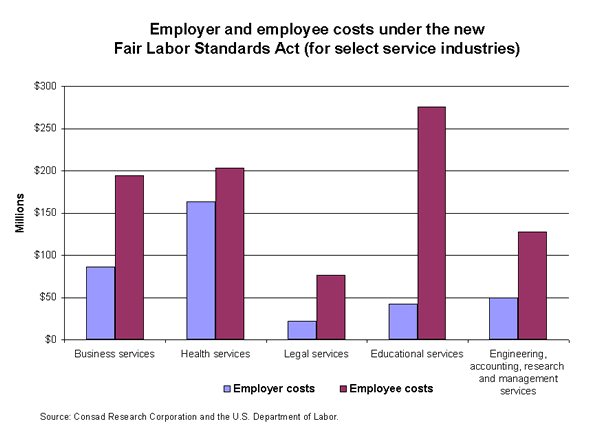Snapshot for April 2, 2003.
Fair Labor Standards Act revisions don’t pay
The Fair Labor Standards Act (FLSA) is the premier legislation protecting workers’ earnings. Currently, the FLSA requires overtime pay for more than 40 hours per week of work, sets minimum wages, and prohibits child labor. The Department of Labor has recently proposed regulations that, by changing the overtime rules, will reduce the pay of hundreds of thousands, if not millions, of workers who earn above $425 a week (or $22,100 a year).
The new regulations propose to raise the wages above which a worker is exempt from overtime pay. Setting a higher salary cap should increase the number of employees who are covered by the FSLA’s protections, but because of other changes, the proposed regulations will reduce the number covered.

The proposed changes that will make many more workers exempt from overtime pay involve the revision and oversimplification of what is known as the “duties test.” The duties test is used to determine how much of an individual worker’s time is spent performing managerial and “professional” tasks. By oversimplifying this test, the government will effectively throw many more workers into exempt status, thereby reducing their overtime pay.
The proof that these changes are a bad deal for workers is in the Department of Labor’s preliminary cost-benefit analysis of the proposal (see the chart above for sample costs to employers and employees by industry). The Department of Labor estimates that the costs of the new legislation to businesses will be between $870.3 million and $1.576 billion. These costs represent estimated one-time implementation costs as well as the costs of covering some new workers. The proposal’s supposed benefits result from eliminating a business’ “potential legal liability from…misclassifying…salaried workers.” In other words, the proposal’s benefits come from making legal a currently illegal practice of misclassifying workers and denying them overtime pay. In essence, the government recognizes that workers are not being paid what they are owed and has decided that the easiest remedy is to change the law to let employers off the hook. The benefits that should accrue to workers—between $1.110 and $1.973 billion—will end up instead in the pockets of their employers. So much for fair labor standards.
This week’s Snapshot by EPI economist Jeffrey Wenger.
Check out the archive for past Economic Snapshots.